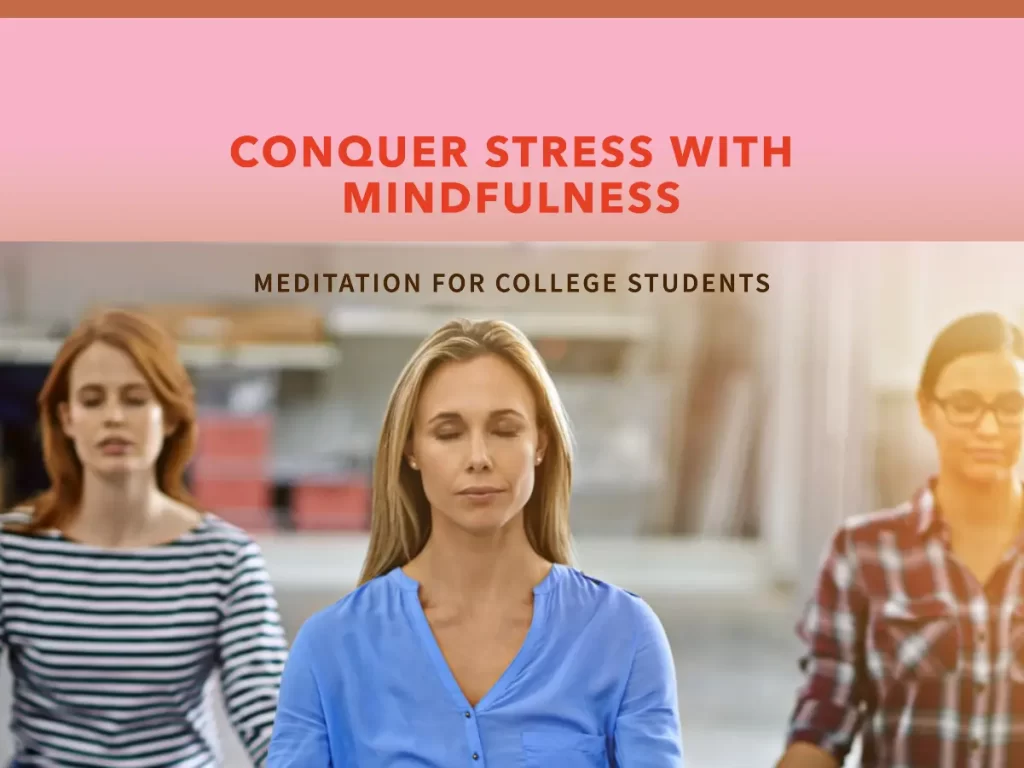College life has been termed a stressful life. Having a packed academic schedule, a bustling social life and maybe even a part-time job is not easy. You may struggle to maintain your health and wellness.
Meditation for college students can help improve your focus and reduce stress. Plus, there are scientific facts to back up the benefits of it.
Meditation for College Students – Why It’s a Game Changer

College students face a lot of stress. The situation becomes tenser when the mind forgets to turn off their physical response to such stress or when the mind turns on the stress response when it is not needed. Problems of this nature can cause stress and anxiety in college students.
Statistics on Stress and Anxiety Among College Students
In a certain study, it was observed that students were stressed in their academics. 53% of them admitted that they are often lonely as a result. Another 31% say that they have had suicidal ideas while 3% have actually tried suicide. 13% of the participants have intentionally injured themselves.
One-third of the college students had been diagnosed with anxiety and are also coping with depression. 8% of the respondents have had to cope with a trauma or a stressor-related disorder. This has caused a delay in their academic progress and had affected their performance significantly.
The report doesn’t end there. In a certain study, 7% of stressed college students have developed bad eating habits. 3% of college students have had intense negative emotions and mood swings.
Benefits of Meditation According to Science
- Meditation supports blood circulation in the brain. This makes a student calm and relaxed especially when faced with board exams and earning good grades.
- Students need energy to perform academically. Meditation can give students the rejuvenation and recharge they need to be energized and efficient.
- Deep meditation can boost a student’s IQ. It can increase creative thinking and cognitive skills.
- Meditation also gives students mental serenity which reduces their levels of stress. It teaches students to find inner peace even in the face of unfavorable and unforeseen circumstances.
- According to research, regular meditation can make students overcome depression and break away from negative habits.
- Meditation also helps students grow personally.
Unlock your Potential with Mindfulness Meditation

The practice of mindfulness meditation didn’t start in this modern world. It has been ongoing for centuries. It is recognized as a weapon that can help you unlock your potential.
Mindfulness Meditation – Definition and Mechanism
Mindfulness meditation is a mental practice. It teaches you to slow down your racing thoughts and get rid of negativity around you. It helps you focus on the NOW so you can recognize and accept your thoughts and feelings without judging them. It is named as such because it is a combination of mindfulness meditation practices.
Mindfulness meditation causes a lot of changes to our brain. For instance, it makes us move from higher frequency brain waves to that of a lower frequency. This change causes activation in certain brain areas.
What this means is that you now have access to parts of the brain that helps you think rationally. So, you are not quick to respond to certain bodily sensations but you have more empathy towards others. It also makes you be in the present moment. Furthermore, it helps you see yourself and others from a new perspective.
Another thing it does it to change the shape of your brain. Sounds funny, right? But meditation has been shown to improve emotional regulation. It does this by 9increasing the grey matter density in the brain. This is what governs the center of emotional regulation.
It also increases the cortical thickness of the brain as well as the amygdala. These areas have impact on our learning and memory process.
Mindfulness Meditation Can Transform Your College Experience – Learn How
- The practice of mindfulness meditation can reduce stress and anxiety which in turn can help college students face the heat successfully.
- It can also make them increase their focus, concentration and attention span – not just in school work but in interviews.
- It can make students develop coping skills i.e. being calm and relaxed when they are stressed.
- Mindfulness meditation also helps students to identify any negative thoughts and feelings. Afterwards, they can alter or modify their thought perception to portray these negative feelings in a positive light.
- With mindfulness meditation, college students can improve the quality of their sleep. Sleep is important for them as it energizes them for the next day.
The Ultimate Guide to Meditation for College Students – How to Start the Practice

Stress is no joke and suffering from stress is not something students should go through at all. That is why they need meditation to combat stress and its negative effects.
Simple Steps to Get Started with Meditation
- Plan ahead: Never leave meditation to chance. So, take an honest look at what you have on your calendar. On what day can you dedicate a few minutes (maybe 2-5 minutes) to meditate? Can you do that in between classes? In the morning after you wake up? Before you go to bed at night?
- Set your timer: If you have a smartwatch, smartphone or tablet, you should get them out. Set your timer on your timer app or clock app for at least two minutes a day. Don’t worry, you’ll be able to sit for longer sessions like the pro soon.
- Get Comfy: There is no one-size-fit-all approach to meditation. If you think you will do better sitting or lying down, no problem. If you think you need support, that’s no problem too. Get yourself a cushion, a yoga mat, beanbag or anything that would make you comfortable. You want to play some music? No problem. Plug in your earphones and have a good time with yourself.
- Eyes Closed: Close your eyes and keep them closed. Alternatively, you can lower your gaze or focus on a particular object to remind you of your daily meditation practice.
- Point of Focus: Now is the time to choose your point of focus which could be your breath or heartbeat. As you do, visualize your whole body through a body scan. Just try to be present with it.
- Have Compassion: You may get frustrated when you feel like you’re distracted. Or maybe you couldn’t keep up. Don’t let that bother you – just acknowledge and let it pass. There is always another day to give it a try.
Meditation Apps and Resources to Help You Get Started
- Insight Timer: This app is great to help prevent negative feelings and improve your sleep. It has audio features and over 200 different topics and guides for college students.
- The Mindfulness App: If you want to stick to a schedule, this app can help. It contains different meditation practices and courses with varied durations.
- Calm: This is great for both beginners and experienced meditators. It contains music, sound effects and audiobooks to cater for your meditation needs.
- Stop, Think & Breathe: Need something brief and easy? Try this app. Within 5 minutes, you would have performed a body scan and improve your mood.
- Meditation Oasis: This is one of the meditation podcasts with guided meditation for students. You can use it while walking or driving.
Mindfulness Practices College Students Can Explore

- Mindful breathing: This means becoming aware of their breath and connecting it to their body. This practice promotes inner sense of being and help manage stress.
- Five senses: This practice makes students engage their five senses to perceive the world around them. They focus on things they can see, smell, touch, hear and feel.
- Mindful movement: This practice can help to ground and stabilize students. When they walk, they can feel the breath rise from their feet all the way to their head.
- Mindful breaks: Taking mindful breaks can help students regain energy and maintain productivity. Have no ideas for mindful breaks? You can try dancing, listening to classical music, singing or even gardening.
- Guided body scan meditation: Students can use this practice to draw attention to their sensations starting from the crown of the head to the sole of the foot. Acting with awareness helps them release any tension or stiffness they feel.
The Power of Randomized Controlled Trials: Proof that Meditation Works
As we have seen, stress and other mental health problems are common in university students. Meditation interventions or mindfulness interventions (like mindfulness-based cognitive therapy) seem to solve the problem. However, there is a lack of randomization over the efficacy of randomized controlled meditation. Thus, this review and meta-analysis is to investigate that.
Exploring the Groundbreaking Randomized Controlled Trials on Meditation
To evaluate the frequency of the students’ depressive symptoms in the past, a questionnaire was scored using a 5-point Likert scale ranging from 0 (none) to 3 (almost every day). Another study was conducted to determine the frequency of stressful situations and anxiety symptoms in students. This time around, stress scores were built on a Likert scale ranging from 1 to 5. The respondents reported high levels of stress and anxiety.
Several factors were included in the analysis like age, sex, and whether or not the students were writing exams. The majority of participants were female. Most of them were undergraduate students while others were postgraduates.
Results on How Meditation Reduces Stress and Anxiety
According to the institutional review board, many of the respondents experienced significant changes in stress levels. There was also a decrease in the physical and emotional symptoms of anxiety and depression. It was also discovered that meditation can help tackle mental health issues.
Meditation can restructure and rewire the brain to adapt to negative circumstances. It can cause it to identify negative thought patterns and modify it to accept more of the positive ones. This change or alteration causes students to feel a measure of calm and relaxation to cope with their levels of perceived stress.
However, future studies may need to be undergone to explore more ways to reduce stress with meditation.
Real-Life Success Stories: College Students Transformed by Meditation

If you’re a student, it will be comforting to know that others have gone into that journey before you and they don’t want to stop. Here are testimonials from those who benefitted from meditation:
Inspiring Testimonials from Students Who Embraced Meditation
Katy Meyers – “Let me tell you about my brother and I. In his first year in graduate school, he began reading about meditation and stress. When he started meditating, his stress and anxiety lessen. For me, my stress was also increasing and whatever method I was using wasn’t working. I told him about it and he said I should meditate. I wasn’t the meditation type but I tried it anyway. I will say that it helped me become more aware of stress cues and has improved my mental and physical health.
Tatiana Posada – “While attending school, I experienced severe stress and anxiety that affected my performance. I wanted to do something about it. Fortunately, my school was offering meditation and mindfulness training and I enrolled. My meditation instructor guided me thoroughly. In about three weeks, I have begun to see a difference – in my academics and my emotions.
Overcoming Challenges: How Meditation Helped Students Thrive
Hayley – “My anxiety started when I felt a certain heaviness in my body. I began to sweat and my heart was pumping hard. It didn’t end there – the problem became a daily occurrence. It was indeed a challenge as I couldn’t participate in school activities. Along the line, I was introduced to a meditation app (Smiling Mind) for a free guided meditation program. I could just plug my earphones like I was listening to music. I observed that this helped me gain focus and improve my progress”
Anthony David Williams – “My academic schedule was already tight. I couldn’t even find a balance between school and my life. When I began to meditate, I was able to develop mindfulness skills that helped me focus more and handle my tasks”
Bonus: Quick Meditation Tips for Busy College Students

Stick around for some tips to get the most of meditation for college students. These tips are timely and effective.
Simple Mindfulness Exercises to Try
- Sitting meditation: Sit then inhale and exhale through your nostrils and your mouth. Observe any physical sensations without judging them.
- Walking meditation: Walk slowly and bring awareness to the sensations of your movements. This keeps you balanced and grounded.
- Breathing exercises: Take a deep breath to fill your belly. Then, fill your ribs and chest. Adding visualization is also a bonus for you.
- Connecting with Nature: Spending time with nature is a good way to be mindful. The smell and sound of nature can send calm signals to your nervous system.
Meditation Hacks for Cramming, Exams, and Stressful Situations
- Find yourself a comfortable place that is free from distractions.
- Put on some music. Music can reduce fear and increase good hormones to help to de-stress.
- Repeating certain words can help teach your brain to store important information.
- Practice breathing as this can release tension, anxiety and stress.
- Start with small number of minutes then increase the time as you want.
Don’t Miss Out: Start Your Meditation Journey Today!
Now that we’ve gone through this, you can tell that it’s not that hard, right? Meditation for college students is indeed beneficial. Don’t procrastinate. Your decision to start now will bring you good health.
Frequently Asked Questions(FAQ’s)
Choose a quiet place and set a time.
First, make up your mind. Next, you set a schedule and time. Then, you prepare your meditation space and get to work.
Let them know what meditation is and how it benefits them. Join them and guide them in meditation sessions.
i. practice mindfulness ii. do body-scan iii. mindful walking iv. use loving-kindness to cultivate compassion v. transcendental meditation for inner peace
Mindfulness meditation can increase your focus.
Get yourself comfortable in a place without distraction. Just breathe and focus on your breath.



